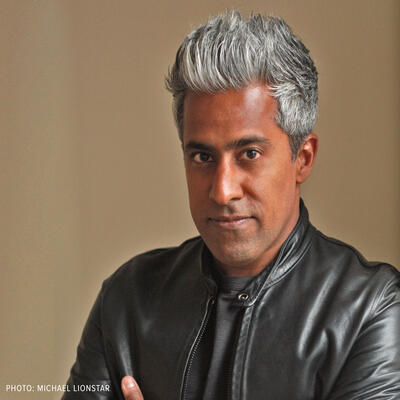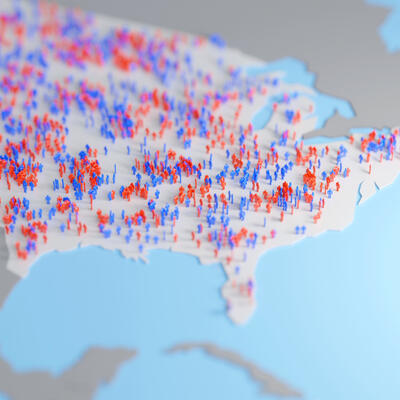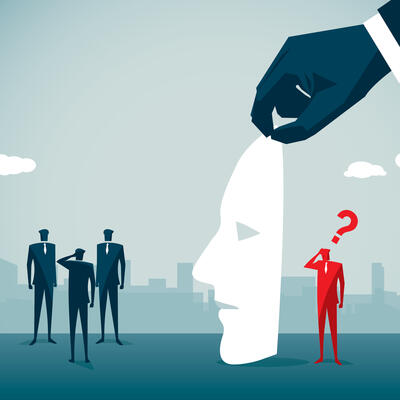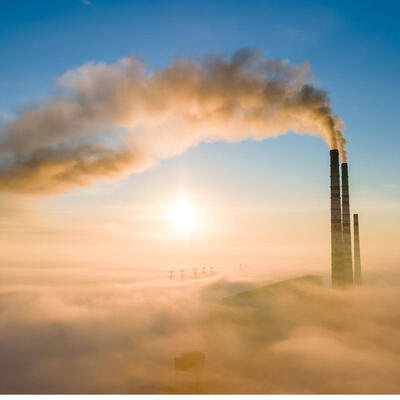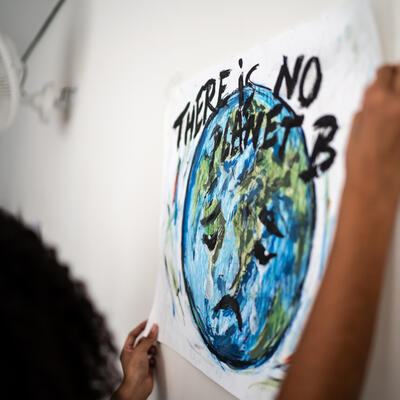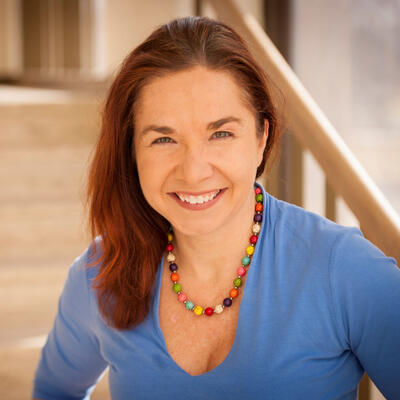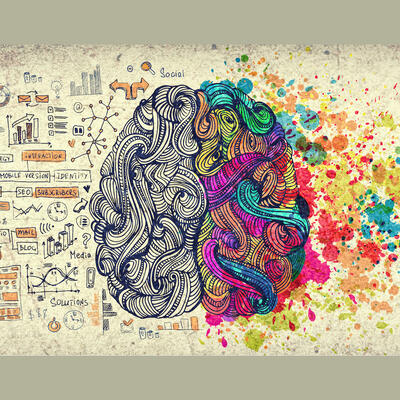
Finding the Heart to Talk About Climate
Guests
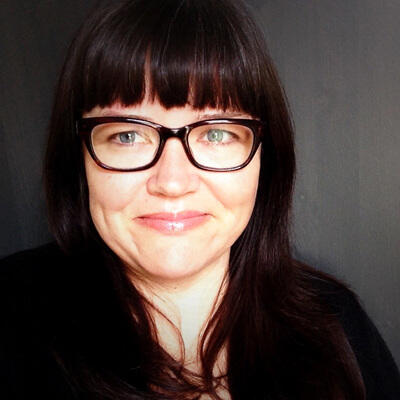
Faith Kearns
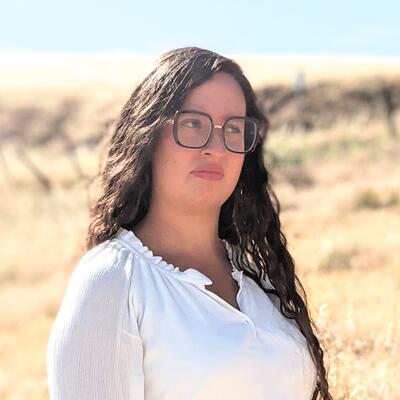
Katerina Gonzales
Summary
More than half of Americans surveyed by Pew have talked about climate change one to two times in recent weeks – and that number is even higher for Gen Z and Millenials. A majority of all groups surveyed think climate should be a top priority to ensure a sustainable future.
While that data may be encouraging, scientists have been ringing the alarm on climate disruption for decades. They often speak from their brains with facts and figures, as they’ve been trained to do. But that approach only goes so far.
In her new book, Getting to the Heart of Science Communication, Faith Kearns offers other, perhaps more effective, ways to engage people on multiple levels.
“When I was younger, the way we would talk about communicating science was often that you would learn how to speak really well, give a good presentation, come up with bullet-message points that you would deliver to journalists,” Kearns says. But that information delivery mode hasn’t proved as useful as scientists might have hoped, especially as it relates to the climate crisis, Kearns says.
“I've had to turn to other professions that have a longer history of working directly with people on very sort of emotional, contentious and traumatizing issues, which is what many of these environmental related issues have become,” she says.
Kearns argues that we all need to move from an “information deficit” model of communication – where it’s assumed that the audience simply needs more information – to a relational model, where the science communicator does as much listening as talking in order to first find empathy and common ground.
That means relying on tools like listening first, and finding ways to understand where your audience is coming from in order to better connect with them on the issues at hand.
Katerina Gonzales, a postdoctoral researcher at Stanford University, says scientists should also work to transform themselves along the way. She says researchers like herself can work to communicate in a trauma-informed way, part of which involves reflecting on how their own background, position and status may have protected them from traumatic experiences.
“Folks who have survived instances of disaster or violence, they have the same triggers and they know what to avoid in a conversation and also, they have a deeper awareness of not just their emotions, but also their body and how it's responding to whatever is coming up for them,” Gonzales says. And that extends to the climate crisis.
“We all can recognize that we already are experiencing climate trauma and that we can reframe our part in the world as interconnected with the public that experiences these things. And yes, all of us are experiencing it, perhaps in different ways because of our different statuses and privileges and backgrounds. And so, I'm not saying that folks who don't experience it acutely shouldn’t talk about it. But I think we should talk about it in a way that is reflective,” Gonzales says.
Related Links:
Full Transcript
Greg Dalton: This is Climate One. I’m Greg Dalton. Why is talking about climate change, and the science behind it, so hard?
Katerina Gonzales: The only way I've learned how to communicate is by practicing and doing and failing a lot.
Greg Dalton: Scientists are taking lessons from other fields to learn how to reach people on a deeper level.
Faith Kerns: Everybody's trying to figure out how do we move past this idea that just arming people with facts will lead to a better world, right, because we’ve just seen that that’s absolutely not true.
Greg Dalton: And it’s not just scientists who are trying to find more effective ways to talk about the climate emergency.
Matt Schlegel: We ended up having about a 50 minute conversation because not only was he a climate change denier but he was also very well versed in the all of the denial talking points.
Greg Dalton: Finding the Heart to Talk about Climate. Up next on Climate One.
Greg Dalton: Why is it so hard to communicate the science of climate disruption? Climate One’s empowering conversations connect all aspects of the climate emergency. I’m Greg Dalton. More than half of Americans surveyed by Pew have talked about climate change one to two times in recent weeks--and that number is even higher for Gen Z and Millenials. A majority of all groups surveyed think climate should be a top priority to ensure a sustainable future. While that data may be encouraging, scientists have been ringing the alarm on climate disruption for decades. They often speak from their brains with facts and figures - as they’ve been trained to do. But that approach only goes so far. In her new book, Getting to the Heart of Science Communication, Faith Kearns offers other, perhaps more effective, ways to engage people on multiple levels.
Faith Kearns: I've been at this for about 25 years, I started as a science communicator in a sort of official science communication job in 1996, which was right around the time that the second IPCC report came out about climate change. And I actually went to the National Press Club and watched an event where some scientists presented their findings there. And it was a very interesting time because the presentation was not particularly dynamic, it was incredibly these are the facts as they are and now, we shall proceed to do something about it. And I think as a young person, I had learned about things like how we dealt with acid rain and the ozone hole. And so, I sort of knew that it was possible to develop these kinds of agreements, arrangements, diplomatic efforts that would address these issues. And I, at the time assumed climate change would be very similar and there is nothing you know the day I watched this report being released that would indicate otherwise. But the past 25 years of my career have certainly shown me otherwise.
Greg Dalton: Right. In fact, Jim Hansen says when he testified in 1988 the hot summer before Congress really when the New York Times published that front-page article. In many ways that's when the public discourse of climate began. He thought that the responsible parties would receive the facts and do the responsible thing. And we’ve took a couple of decades to learn that human beings are not quite as rashly responsive as we all expected.
Faith Kearns: Yeah. And it's been interesting to be somebody who is sort of raised up professionally and scientifically during that change if it was a change that where we went from this the sort of this will just get addressed in the way that we've addressed many big problems to becoming something that has obviously become quite intractable to deal with. And so, that has also changed for me, how I think of communicating as a scientist. So, you know, when I was younger the way that we would talk about communicating science was often that you would learn how to speak really well give a good presentation, come up with bullet-message points that you would deliver to journalists hopefully at the New York Times. And you would hopefully be speaking from a position of tenure at Stanford or some other elite institution. And I think as we both know none of those things are quite as useful as we might have hoped, and instead what I found with myself is I've had to turn to other professions that have a longer history of working directly with people on very sort of emotional, contentious and traumatizing issues which is what many of these environmental related issues have become.
Greg Dalton: So much of climate communication is based on this deficit model of communication. Can you tell us what the deficit model is and is it still kind of the main primary model for the people operating on?
Faith Kearns: Yes. So, the deficit model is basically this idea that in order to take action essentially or to do something people just need more information. And this is not particular to the sciences. I've worked for a large environmental NGO where a lot of the focus was on the idea of awareness, right. Everybody's trying to figure out how do we move past this idea that just arming people with facts will lead to a better world, right, because we’ve just seen that that’s absolutely not true. And even just today on Twitter this morning, I was noticing a conversation about, you know, whether we need more climate change information then that's the thing that's going to make people care. This was in the Washington Post this morning. And so, I still think that's a very, very tense space but the basic idea is just that you know in many ways the way that showed up in the sciences, I think, is because science communication in many ways evolved from faculty who were used to teaching, right. And so, you can't say that you don't think that teaching model is helpful when you're very deeply invested in it, right. And so, we’ve had this reckoning where people I think realize that even that teaching model doesn't work as well as people had hoped. And so, you know, I think this is a broadscale reckoning about how we work together. And I think what's more helpful for me rather than sort of sitting there as somebody who says I know what we need to do you know and now I just need to get everybody else to do it, which to me is a lot of focus of the behavior change psychology piece. It’s actually to say we’re all facing the sort of same dilemma and I know a few things and you know a few things. What are we going to do? Because for me, that has become really the only way to navigate this kind of work you know it's not as useful anymore from where I sit, as somebody who works directly as a practitioner every single day to be on any kind of pedestal thinking I have the answers. I have some but not all.
Greg Dalton: It sounds like you’re really talking about empathy with the audience, and you came to that place through some tough lessons. As a young scientist you spoke to a group about fire science in an academic way without acknowledging that you were talking to fire survivors in a way that was retraumatizing to them. Tell me about that experience.
Faith Kearns: Sure, yeah. So, in about 2007 in an event that will seem familiar to many people now, but at the time was not. I was with some colleagues up in Ukiah in Northern California and we were participating in something called a fire safety demonstration where you know a couple times a year you might go out to a fairgrounds or something like that and sort of talk with people about how you can keep homes from burning down during wildfires by doing things like making sure your attic vents are covered with screens that embers can't get through and things like that. And so, those are really important parts of what I do as somebody who works in what's known as cooperative extension, which is a part of the University system dedicated to kind of taking science and making it applicable for people every day. And so, what we didn't realize that day was that we were talking to a community that had just been through a wildfire season it was pretty bad a few months before that there were huge fires burning in Big Sur that summer and then another wildfire complex started in Mendocino County. And so, the folks that we were talking to had just survived a wildfire and they were dealing directly with many of the issues that we were talking about in a fairly intellectually distanced way. For example, how to maybe stay and protect your home during a wildfire, right, which is clearly an incredibly emotional issue. And then, you know, just talking about what people can do to make sure they're prepared to evacuate I think brought up varying feelings for people, you know, some people were really grateful that they'd been able to do it and other people had guilt about things they left behind. There are just a lot of emotions in the room. And it was the first time that I let myself kind of really feel that as a scientist and not assume that it was something that I wasn't gonna contend with, right. And so, part of that was because a man came up to me afterward and he basically shared with me in not using these words and words that took me many years afterward to figure out what he was saying but he had said, your presentation retraumatized me and made me, you know, rethink how I had dealt with this fire and things like that. And I did spend a year or two really thinking a lot about the conversation and it really reset my entire career to kind of try to understand how I could work on an issue like fire that has such direct meaning in people's lives in a way that wasn't so intellectually distanced and what would it mean to be a scientist trying to do that. Because in many ways we are very much encouraged to stay neutral “objective” and not let feelings get involved in the things that we’re doing.
Greg Dalton: Yeah, sure. Yeah, rational, you stay up in your head, you’re not human in a way, right?
Faith Kearns: Yes.
Greg Dalton: Sort of not quite, robotic is unfair but, you know, dispensing facts, right, just the facts kind of thing. And yet that was 14 years ago since then, the American West has burned tremendously, particularly last year in 2020, where millions of people across American West were inhaling wildfire smoke for weeks at a time. So, does that mean that everyone is traumatized to some extent by wildfire and you have to think about potential trauma for everyone you're speaking to about wildfires in the American West?
Faith Kearns: Well, I think the short answer is yes, it should be something that is in the background for all of us. The longer answer to me is that trauma is a complicated topic as Dr. Theopia Jackson who I interviewed pretty extensively through the bulk who is a psychologist practicing psychotherapist and professor at Saybrook University kind of told me, you know, the trauma bucket is becoming sort of all-encompassing these days. And it's complicated because for some people trauma can mean something that is lifelong lasting for other people it can mean something that kind of comes and goes. And so, when we talk about trauma, we also have to understand it means many different things for many different people. And Dr. Jackson is also very careful to say that you know we shouldn’t label other people as being traumatized that’s something for people to say about themselves. And that there are different sort of culturally responsive ways of thinking about trauma. So, people who’ve been through a lot of trauma for example, might not experience something like wildfire smoke as being at the top of their list of traumas, right. So, I think we have to think a lot and very carefully about how we use that word. But on the other hand, I do think we are seeing people who all over the state of California and certainly throughout the West who have a very heightened experience of wildfire smoke. You know I talk to people all the time who say, I smell a barbecue and I, you know, my Spidey sense has go off, right.
Greg Dalton: Right. And there’s also a racial lens here where there’s been articles lately about how white people are kind of new to this trauma, indigenous or African-American people like hey, we’ve been traumatized for centuries this is not new to us. We’ve had all sorts of existential traumas before and the eco-anxiety is kind of a white phenomenon. Often, we don't know what kind of question might be triggering for members of our audience. How do we deal with that without being afraid to raise difficult topics to be on eggshells all the time?
Faith Kearns: Yeah, that's a very good question and I think one I navigate all the time. So, one of the focuses in the book is also on listening and not as just this sort of empty exercise and listening empathetically, which is definitely important. But also what does it mean to listen with an eye toward justice, right and accountability and those are sort of different things. But at the sort of microlevel I’ve started to do things like for example I used to during presentations like many people in my field show slides where things were on fire, right, just to get across the importance of the issue the fear of the issue. I had to shift it out because I think people already get it. And so, showing people pictures of things on fire to me, is a risk that I don't need to take you know in terms of traumatizing people. So, I tried to move in the direction of having fire depicted in some other way whether it's graphically or just not even using those kinds of images, right. So, that’s a very simple thing. The other thing I tried to do is say to people in a group, you know, there may be some people who have experienced this directly and I try to give space for people to bring that up right in the beginning, before I launch into things. So, it sort of depends on how you as a person are comfortable and I think what I'm trying to move in the direction of the scientist as a group, or at least those of us who want to do this kind of work being able to handle having those kinds of conversations that may take you off track from what you think you're presenting but to realize that that's part of what we need to be doing is we actually we need to be attending to help people feel about these things.
Greg Dalton: Yeah, I was struck by you talk about Danielle Lee, a black scientist who traveled to Tanzania where she said she learned that “Listening is good science” and that struck me because I often think of scientists on the pedestal dispensing wisdom and knowledge, not necessarily as listeners unless they’re maybe doing interviewing kind of social science.
Faith Kearns: Yeah, indeed, and that's why I really focused in on listening in the book and tried to give these very concrete examples of people who are actually pioneering listening work in the sciences what it means to actually incorporate that and not just how do you listen but how do you also think about issues of extraction. How do you think about what you do really with what you hear, because those are two very different things. And I think because of the discovery nature of science which Dr. Lee is very much talking to we can sort of go in and think oh I heard something now I get to write a paper about it, right. And that's not what I'm talking about, I'm really talking about what is our responsibility to people and communities and how do we listen to them and work with that information ethically.
Greg Dalton: Today we’re talking about effective climate communication. Coming up, we hear about a researcher who considered another approach to driving change around equity, justice and climate:
Katerina Gonzales: If only the people in power felt then they would do something. If only they felt compassion stirred in their hearts. If only they could empathize more then things would begin to change.
Greg Dalton: That’s up next, when Climate One continues.
Greg Dalton: This is Climate One. I’m Greg Dalton, and we’re discussing how to talk about climate change more effectively. Katerina Gonzales studies climate dynamics in the Department of Earth System Science at Stanford University. She just defended her dissertation, focused on atmospheric rivers and their role in a disrupted climate.
Katerina Gonzales: So, atmospheric rivers are these plumes, these corridors of concentrated water vapor in the atmosphere and they can travel for miles and miles and miles. And our water in the West, atmospheric rivers provide a lot of that water in the form of precipitation. And there been a lot of disasters, a lot of floods, a lot of even landslides, debris flows that were catalyzed by atmospheric rivers. And a good portion of my dissertation is looking at characteristics that can tell us about what sort of on the ground impact that atmospheric rivers will have.
Greg Dalton: The climate conversation is complicated, awkward and difficult, and has been politicized which makes it even tougher to talk about. But Katerina Gonzales says when trying to communicate her research, she sometimes comes up against another obstacle--being fascinated by the work itself.
Katerina Gonzales: Sometimes I go into a conversation and what I want to share the things I'm most excited about are about these filamentary plumes in the atmosphere that are so important to us and they’re beautiful and they’re artistic. And like I can talk for an hour on just how interesting they are. But as a scientist who’s also a climate scientist, something I'm navigating is when can I talk about just my work and when am I expected to talk about climate change and the state of our climate and extreme events in general. I've been just navigating and learning how to talk about climate particularly in my early grad school years made a few blunders. And one that comes to mind my first year in grad school was middle school outreach to a private middle and high school here in Palo Alto. And all I remember is going in thinking yes, I’m gonna talk about extreme weather events. And the Q&A was about, there are questions like when are all the polar bears going to die? And really like sad questions from middle school it was very innocent earnest questions. And then also there was a lot of questions about solutions like, my daddy owns a Tesla. Does that mean climate change isn't going to happen anymore or is that going to be enough? And one of the students asked, oh well, if I take shorter showers will that help climate change? And I just remember just blurting out, no, it’s fine I take 30-minute showers and like that’s not really gonna make a difference. And everyone was like, oh you just like see like the whole audience go aghast. And then I was like that’s not what they wanted to hear and that’s not even what I wanted to say. But I was going in as a climate scientist talking about weather and then it became about energy transition, right. It became about individual actions and how that's going to “save” a particular part of the earth.
Greg Dalton: Gonzales says it’s taken years of reflection and practice to communicate about difficult subjects, climate and otherwise.
Katerina Gonzales: And only now can I look back on that instance back at the private school and identify what's going on with the individualism in the room and the lack of systems thinking. And also, from my end, the lack of trauma informed communications and very important things like that. The only way I've learned how to communicate is by practicing and doing and failing a lot, but a lot of my education and communicating about hard subjects came as I was moonlighting per se as a community organizer throughout the years in my PhD. And a lot of the topics that we were tackling or the issues and the material conditions were very, very not so necessarily they were very, very disturbing, right, it’s similar to climate change. Some of these topics of like the deficit-oriented way of communicating science I learned that when I was working to undo harassment in spaces because I assumed a deficit, a knowledge deficit by those who had power. And then only by like trying and failing that I realized that oh pure knowledge is not power.
Greg Dalton: Elsewhere in this episode we’re talking with Faith Kearns about her book, Getting to the Heart of Science Communication. Kearns describes talking to fire survivors in a way that re-traumatized them. I asked Katerina Gonzales about how she avoids similar pitfalls. One approach, she says, is for scientists themselves to go to therapy.
Katerina Gonzales: We talk about scientists going to therapy particularly climate scientists going to therapy to cope with the devastating impacts of climate change and the grief that were ourselves going through. And that is true, and I don't want to invalidate that. But my firm belief is that we should go do in our work whether that's therapy if we can afford it, but truly transform ourselves to undo these things we’ve been learning the whole time, right. The other way I think about communicating trauma in a trauma informed way is that it's actually even more easy to communicate in that way when you yourself have been through a similar trauma, right. And so, folks who have survived instances of disaster or violence they have the same triggers and they know what to avoid in a conversation and also, they have a deeper awareness of not just their emotions, but also their body and how it's responding to whatever is coming up for them. We all can recognize that we already are experiencing climate trauma and that we can reframe our part in the world as much interconnected with the public that experiences these things. And yes, all of us are experiencing it perhaps in different ways because of our different statuses and privileges and backgrounds. And so, I'm not saying that folks who don't experience it acutely shouldn’t talk about it. But I think we should talk about it in a way that is reflective and is yeah that acknowledges where we are positional wise.
Greg Dalton: Gonzales says her experience in academia has been influenced by being a woman of color. She says her awareness of the gender and power dynamics in a largely white and male cohort began while earning her undergraduate degree at the Colorado School of Mines and continued at Stanford. She feels fortunate that she was supported in her academic career, knowing that wasn’t true for everyone.
Katerina Gonzales: I try to talk about my experiences as a Hispanic woman in STEM, particularly more recently, I think in undergrad I was focused more on gender equity and didn't have a lens of intersectionality and how all forms of oppression can intersect. And so, recently in graduate school I've been tackling that and examining both how I exist in the world and how comfortable or uncomfortable or supported or unsupported I am. But on the individual side also working to undo the harmful narratives I've internalized as a relatively light skinned woman of color for example. In the latter part of my PhD I was awarded a fellowship for minoritized individuals who are seeking to pursue a career in academia. And in that they try to build a cohort of folks who are going to the same thing at the latter stages of their doctoral dissertation. It was a fantastic, fantastic experience for me. And something I noticed when I entered that space with other bodies of color which is the way that we interact the way that we’re embodied and how we laugh, how we talk, all of these things, right. And so, I’ve been able to find pockets of spaces in the academic environment that are curated and supportive refuges, almost, in an environment that can often be not safe for many folks like me and others of minoritized identities.
Greg Dalton: She says that personal experience influenced her theory of change. She shifted from following the information deficit model of communication that Faith Kearns described to more of an empathy deficit model. But her evolution didn’t stop there.
Katerina Gonzales: So at first, for example, when I was working issues related to sexual harassment and academic spaces. My colleagues, my co-organizers, we sort of had this ideology of if only the people in power knew, then they would change. And then, you know, after a few tries a couple years we were like this is not working this is not working and this is bad And so, then my ideology or my theory of change was more if only the people in power felt then they would do something. If only they felt compassion stirred in their hearts. If only they could empathize more then things would begin to change. And I don't think that's completely false. I think feeling and empathy dare necessary precursors to changing things. But what we thought would happen or what we subconsciously believe is that people in power whatever or however that's defined would then make structural changes. That then we can around about came to this new theory of making stuff happen is building community and building relationships. So, my current theory of change is that it's a power deficit.
Greg Dalton: Gonzales says her peers are having a vocational crisis, tied to the upheaval of recent years and the budget cuts to climate science, along with increasing occurrence of climate disasters. I asked how she’s preparing to enter the field as a woman of color, knowing that she will likely have to deal with the nasty politics, and possibly personal threats for her work.
Katerina Gonzales: So, when I think about that I tend to have more compassion for others, which is something I’m working on, right. I think about my peers entering the field at the same time. And I think no way that I cannot let that happen. What am I going to do for them and then I realized, oh, like I am also vulnerable to this backlash this both professional or interpersonal violence, right? So, I guess to sum up that the only way we’re all going to get through both across whatever identities that we all hold and I'm trusting that our listeners want to dismantle the system that keeps us from making the progress on climate change that we want to. But we have to do it with deep, deep care and love. I’ll use that word some people prefer solidarity which is very similar. And so, yeah, probably I'm going to not have a great time all the time in my career because folks want to well, because the world is the way it is right now. But, despite that, it's just that deep like care that like intense teethy(?) care that will keep me going and then the care of others, my peers, my supporters who care for me like that's what keeps me going currently. And I hope to show up really well for others as well.
Greg Dalton: Katerina Gonzales is a postdoctoral researcher at Stanford. After the break, we dive into new ways of thinking about communicating climate science:
Faith Kerns: Instead of thinking of ourselves as experts that are sort of outside of the work, we’re kind of really in it too. We’re in relationship with people, we’re not just delivering information to people but we’re really kind of trying to figure things out together.
Greg Dalton: That’s up next, when Climate One continues.
Greg Dalton: This is Climate One. I’m Greg Dalton. We’re talking about how to have more effective climate conversations with Faith Kearns, author of the book, Getting to the Heart of Science Communication. She says one key component of that work is taking a relational approach. Now we return to my conversation with Faith Kearns. She’s author of the book, Getting to the Heart of Science Communication-- a sort of how-to guide for more effective conversations, like around climate. One key component of that work is taking a relational approach to communication.
Faith Kearns: So, thinking about things as relationship-centered is what came to me through looking at how practitioners and other fields, including law and medicine psychotherapy and increasingly many other fields think about sort of direct doctor-patient or lawyer client interactions. So, I really came at it from a sort of professionalized practitioner perspective which we don't often think of scientists as being, we often think of them as researchers, right. And so, we don't think of ourselves as particularly having the patients or clients. I started trying to figure out how other people in these sorts of positions that can very much lead to burnout that involve a lot of emotion and conflict were getting through. And so, I stumbled upon some medical work on relationship-centered medicine and then started talking with a good friend who’s a lawyer about how she deals with some of these things. And it led me down this rabbit hole of people who were already thinking about this kind of thing in professional contexts. And then at the same time I have been learning more and more about sort of Indigenous and sort of Black feminist and even just cultural and spiritual traditions that include relationship, right, like some forms of Buddhism you might talk about right relationship. In Indigenous works they talk about kinship and everybody being related and not just humans, right but with animals with rocks with plants.
And so, this is an incredibly rich concept and it is basically in my mind how humans organize themselves. We are in relationship to each other we are in relationship to the natural world. And so, I've tried to provide an overview in the book of all of those different approaches but focusing pretty strongly on the professional side because I’m also just trying to provide practical relief to science communicators like myself. So, the basic idea that I think about is that you know instead of thinking of ourselves as experts that are sort of outside of the work, we’re kind of really in it to we’re in relationship with people we’re not just delivering information to people but we’re really kind of trying to figure things out together. And in order to do that the kinds of skills that I talk about in the book which are primarily listening, working with conflict and understanding, trauma, or at least a beginner set of tools to start thinking about relational work within the sciences and particularly science communication.
Greg Dalton: You also wrote that “the focus on performance has meant armoring scientists with repeatable messages and emphasizing scientific authority which have the effect of creating distance rather than enhanced connection," which is kind of the relationship we’re talking about and yet, TED talks which are polished theatrical performances are wildly popular. Doesn’t that mean that they are effective?
Faith Kearns: Sure. I think you know in the book I try to be really careful to say it's not the information isn't important. I just say it's the beginning, right. And so, we've tended to talk about this information delivery piece as the whole shebang. And what I’m trying to say is that's just the entry point. So, something like a TED talk it’s very entertaining. You might get a set of information out of it. But then what, what do you do after that? There's a whole world beyond that, and what I'm trying to say is that there's a role for science communication in that other space that goes beyond the performance of that 15 minutes of delivering information, right. That cannot be the end of the story. And unfortunately, I think for most of my career that has been seen as the entirety of the story.
Greg Dalton: Yeah. And so, the distance so there’s working that relationship which is true in journalism and media too, you’re not supposed to get close to your sources close to people who are, you know, guests on your podcast or radio show, right. There supposed to have a little bit of distance, right, because that’s professional.
Faith Kearns: Yes, absolutely, and I actually you know, I draw some from journalists who are also kind of trying to figure this out. There's a very obviously active conversation happening within journalism that's in some ways parallel. Although the professional worlds are different, but at the same time I do see journalist sort of the same. What is it mean to be objective and talking about things like transparency instead which is kind of the approach I try to take in my writing as much more to say this is who I am and this is where I'm coming from, right. And so, instead of having this assumption that I'm objective, which is in my mind it's very difficult for humans to be objective because we are subjective beings in so many ways. That doesn't mean that the scientific method for example, isn't designed to help do sort of more objective methods and things like that. But when it comes to science communication we’re really in a space where we’re using and I argue should be using our subjectivity to communicate. Otherwise we are in many ways the robot that you referred to.
Greg Dalton: Does that mean that scientists should cross the line into advocacy?
Faith Kearns: So, advocacy is a, you know, tends to be a dirty word within the sciences --
Greg Dalton: And journalism.
Faith Kearns: Yes, very much so. And I just have a struggle with even understanding what that means. Even as a very young scientist I just thought how can it be that you spend your lifetime studying something that you know very well, and in fact because of the specialty of science you may know better than almost anybody else on the planet and then you're not allowed to have feelings about what happens after that. I mean that to me is harmful. It's harmful to people in the sense that you know you've built up knowledge about something and your perspective on it should matter, at least as much as other people does.
Greg Dalton: I’d like to talk about showing emotions in the process of communicating. You relate a story of Harvard historian Naomi Oreskes arguing that sciences should demonstrate alarm when they're using alarming language. Say more about that episode.
Faith Kearns: Yeah, so, Dr. Oreskes just wrote this really, she's written a couple of things about this idea that you know scientists are saying similar to the fire story I was saying, right. They’re saying these very alarming things but in tones that aren't like there's smoke everybody evacuate you know it's very monotone kind of like the apocalypse is coming, but nobody worry. And I think the disconnect between those two things has been very, very difficult in the sciences. And I think we’re still figuring it out and, you know, Dr. Oreskes and others have spent a lot of time particularly in the climate space trying to figure out what that might look like and how you kind of maintain your professional reputation and that sense of authority. And you know for me I think the thing that I try to get across a lot when I'm talking about this is that I'm really not talking about instigating feelings in other people. What I'm talking about is really just contending with the emotion that is already there. So, for example you know we’re entering another drought year here in California, right. You can feel the agitation with people. And I have spent many years you know going to a church on a Saturday morning to talk to people about their drought tolerant landscaping. And this idea that people don't care that there's apathy to these issues to me I never understand it. All I can think is that if you're feeling that you haven't spent a lot of time on the ground. There's nobody who doesn't have something to say about water. There are very, very strong feelings about fire about climate change, about all of it. And so, to me it's much more just being comfortable enough in that space to work with that set of emotions and not only with what other people are feeling, but what that brings up in me.
Greg Dalton: Right. And later in this episode we talk with Katerina Gonzales, she just received her PhD from Stanford and talks about sort of inside out, kind of that inner world doing inner work, personal work, therapy, etc. allows her to build a community we’ve been talking about and also relate to audience as the change begins on the inside. What is the most emotional climate conversation you ever had?
Faith Kearns: Wow. I've had so many but I will say I have an ongoing dialogue with a colleague and friend who I won't name, I think, who we talk a lot about how difficult this work is in terms of the issues that we see coming or that in many cases are already present. And the dialogue and again, it goes back to some of what Dr. Oreskes was talking about, but this is even on a much deeper level because it's community-based work. So, what does it mean to really say to people this place that you live is going to be largely uninhabitable in 15 years? And to know how frightening that is to people while you're not outside of it, you know, you may not live on that strip of land but you see it, you experience it, whether it's from fire from sea level rise from groundwater contamination so just these deep experiences of kind of seeing what's coming, needing to communicate that needing to work with other people's emotions and your own all at the same time. And that is and having no training to do it, right, so that’s another piece of this is that so for example if you are say a social worker, even at least have some introduction to how to have boundaries, how to take care of yourself in that work. And again, I'm not saying those are perfect professions but we don't even have that kind of discourse happening right now. So, I think that's where the old sort of dialogue about science communication has really fallen short is this that we are dealing with tremendous problems. And it isn't so much a matter of just let me move the chess pieces of who lives where and who does what and, you know, all of these things. We’re just all in it together.
Greg Dalton: We’ve heard from a number of listeners about difficult climate conversations they’ve had and like to play back a bit of want to get your reaction.
[Start Playback]
Matt Schlegel: Hi, my name is Matt Schlegel, and I'm in Palo Alto. And I had a challenging conversation with a colleague of mine when the polar vortex was occurring and my colleague lived in Michigan at the time and he is experiencing it and I brought up climate change in that context and that's when I discovered that he’s a climate change denier. And so, we talked through you know why that was happening and how climate change could be causing the polar vortex and he's a very smart guy and he listened and he understood and we ended up having about a 50-minute conversation because not only was he a climate change denier but he was also very well-versed in all of the denial talking points. And so, we worked through all the talking points and at the end of the day after we work through all the talking points. He said, look, even if it is happening there's nothing we can do about it because I don't trust the government to take action to solve it. And that's when we got to the point where he was just ideologically against having governments take action and I couldn't get over that particular talking point with him. So, that's where we left it.
[End Playback]
Greg Dalton: Now, there is a person talking about in relationship with someone Matt Schlegel is talking about a friend. He seems to put a lot of time and energy going through all the talking points. What would be your advice to other listeners who find themselves in a similar situation when they’re -- with someone they’re in a relationship with?
Faith Kearns: I think it's different for everybody. I certainly have climate change denialist or questioners or whatever kinds of words we’re using these days in my own personal life very close to me. And I am somebody who tends to shy away from attempting to convince anybody about things because I see --
Greg Dalton: Don’t try to change someone's mind.
Faith Kearns: Yeah, and I see them the way that works even on my own self, you know, and sort of, so, I’m sort of somebody who you know, even when it comes to like a COVID vaccine it’s much better if you come to the conclusion on your own than for me to try and push it. And so, I've been watching a lot of these conversations where people are trying to convince somebody that they need to get vaccinated and it's fascinating to watch because I've never seen somebody say, oh, you're right I'm going to go get vaccinated right now, right. So, I tend to kind of look at it on a more systemic level. So, even though you may have these people in your life who feel that way, when we really look at the overall picture, we have put too much of an emphasis on denialism. And I'm not saying that there is not a well-funded denialist movement there absolutely is. I have been affected by it myself directly. I know it's there and yet at the same time, many people care about this issue. And so, I think we get way too fixated on the people who just who either don't or don't see action as viable or ideologically aligned with them because when you look at something like the Yale climate center’s studies on the Six Americas you just see more and more people shifting. And we actually have a majority we have a majority of folks in this country who are concerned about climate change.
Greg Dalton: Each chapter of your book ends with a series of questions for exploration. I’d like to turn some of your own questions back on you and ask where do emotions conflict and power struggles occur in your own science communication practice?
Faith Kearns: Every day. That's more of a quantity issue. But I work on water in California. It's an incredibly emotional, contentious, traumatizing issue. So, and it's one of the key areas that I started to notice this just absolutely technocratic conversation like, you know, Greg, I’ve actually talked to you about water on your show before, right. And part of that was talking about this idea that people can have a barrier to entry, right, like that, somehow, to even talk about water in California you have to understand the Bay Delta, you have to understand how water is transferred from the north to the south. But there are people like Casey Walsh who’s an anthropologist at UC Santa Barbara saying people's experience of water is actually much more intimate, right. We literally take it into our bodies.
Greg Dalton: It is life. It is life, yeah.
Faith Kearns: Water is life in the sort of Indigenous movement. And so, this idea that we have to talk about things in this way that is just so disconnected from our daily lives as both a way that you hold expertise in check, right. You sort to say you can’t even be in my expert conversation. And so, what I've tried to do is actually say like there is a felt experience of water and these two things are not disconnected from each other. I mean, most people in the state I think are pretty aware that we have a very dry year right now. And it brings back immediate memories of the drought that we barely just got out of or maybe weren't even out of.
Greg Dalton: I don’t think we’re out of it. Some were saying it’s a megadrought, the last 20 years have been basically a drought. How do you take care of your own emotional well-being?
Faith Kearns: Yeah, I mean, I will say COVID and writing a book and all of those things have made it pretty difficult. And I have had to do some pretty drastic things. So, for example, when the holidays came around in December, I actually had to call my supervisor and just say you know I was gonna take vacation starting a week from now but I’m gonna start today. And I actually ended up taking three weeks off of work in a way that was quite spontaneous because I had to. I could feel I was just I was getting to the limit of what I can handle. And then you know just recently went and slept on the ground for a couple of weeks with no Internet access, which is incredibly helpful, you know, just getting out as somebody who works on these environmental issues I just see this onslaught of terrible news all day long. I mean, I'm sort of filtering it through my body on a daily basis. And so, really figuring out how to manage that better is super, super challenging. And so, things like yoga, you know, taking a walk and the, you know, just the stuff we all do to manage ourselves. And that being said, even all of that stuff is still very, very hard to do because you can start to feel like you know that you can get yourself into a savior complex. You can get yourself into all sorts of spaces and so there are spiritual contemplative practices that I use, I have a fairly strong sense of the serenity prayer which you know if I’m really triggered on a daily basis could just kind of be like, Faith, you are just not in control here. And just that immediately can make me take a breath and go alright like I can eat lunch now I don't have to stare at my computer right now.
Greg Dalton: The beloved pastor at my high school would stand up and say the serenity prayer couple times a week. And yeah, the idea that we’re in control is an illusion or which is intense when you think that the climate is collapsing and we need to take control to do some things that's a really tough one. Faith Kearns is author of Getting to the Heart of Science Communication. Faith, it’s been a pleasure to talk with you again. Your work is very important getting from the head to the heart and going to that brave vulnerable place. Thanks for your work and thanks for coming on Climate One.
Faith Kearns: Thank you, Greg.
Greg Dalton: On today’s Climate One... We’ve been talking about communicating about climate science and other weighty issues with Faith Kearns and Katerina Gonzales. To hear more Climate One conversations, subscribe to our podcast on Apple, Spotify or wherever you get your pods. Please help us get people talking more about climate by giving us a rating or review. It really does help advance the climate conversation.
Greg Dalton: Brad Marshland is our senior producer; Ariana Brocious is our producer and audio editor. Our audio engineer is Arnav Gupta. Our team also includes Steve Fox, Kelli Pennington, and Tyler Reed. Gloria Duffy is CEO of The Commonwealth Club of California, the nonprofit and nonpartisan forum where our program originates. I’m Greg Dalton.


